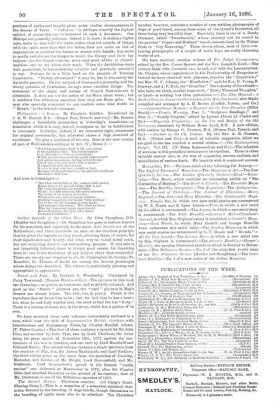Wallenstein : a Drama. By Friedrich Schiller. Translated by J.
A. W. Hunter, B.A. (Kegan Paul, Trench, and Co.)—Mr. Hunter challenges a formidable comparison in Coleridge's translation—a translation which it is easy, indeed, to surpass as far as faithfulness is concerned. Coleridge, indeed, if we remember right, ornaments his original occasionally, but otherwise shows a high standard of excellence. We give a specimen of the two. Here is the new version of part of Wallenstein's soliloquy in Act. IV., Scene 4 :— " Not what proclaims itself in life and vigour Is the appallirg fear. The commonplace It is, the eudiesi chain of yesterdays, Which aye has been and aye again comes round And serves to-morrow, having served to-day ! For of the ey'ry-day min's life is made— II
s nurse he calls her cu-tow.
WGe be to him who lays n. hand on that, His dear old household-store, the precious heirloom His fathers left him."
And here is Coleridge's — "Not that which full of life, instinct with power, Makes known its present being, that is not The true, the perilously formidable.
Oh no ! it is the common, the finite common. The thing of an eternal yesterday, Which ever was, and evermore returns ; Sterling to-morrow, for to-day 'twas sterling! For of the wholly common is man made, And custom is his nurse! Woe then to them Who lay irreverent hands upon his old House-furniture, the dear inheritance From his forefathers."


































 Previous page
Previous page